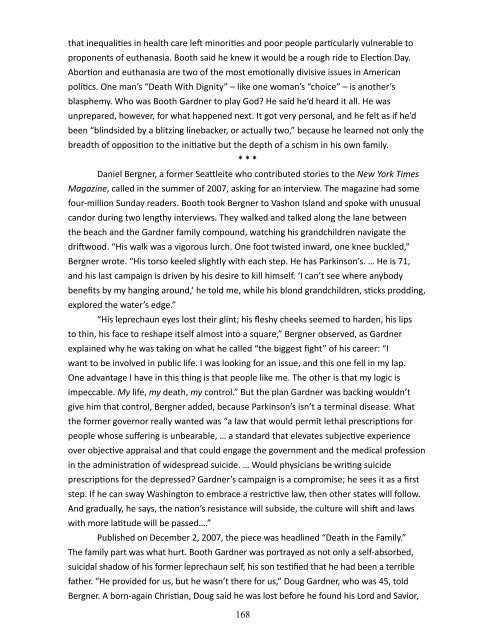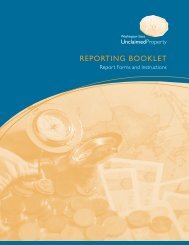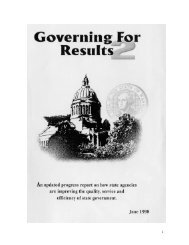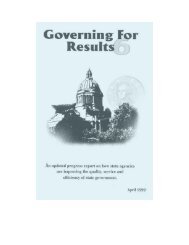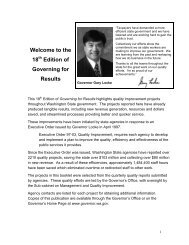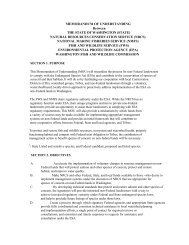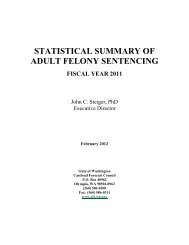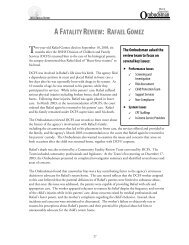BOOTH WHO? - Washington State Digital Archives
BOOTH WHO? - Washington State Digital Archives
BOOTH WHO? - Washington State Digital Archives
Create successful ePaper yourself
Turn your PDF publications into a flip-book with our unique Google optimized e-Paper software.
that inequalities in health care left minorities and poor people particularly vulnerable to<br />
proponents of euthanasia. Booth said he knew it would be a rough ride to Election Day.<br />
Abortion and euthanasia are two of the most emotionally divisive issues in American<br />
politics. One man’s “Death With Dignity” – like one woman’s “choice” – is another’s<br />
blasphemy. Who was Booth Gardner to play God? He said he’d heard it all. He was<br />
unprepared, however, for what happened next. It got very personal, and he felt as if he’d<br />
been “blindsided by a blitzing linebacker, or actually two,” because he learned not only the<br />
breadth of opposition to the initiative but the depth of a schism in his own family.<br />
* * *<br />
Daniel Bergner, a former Seattleite who contributed stories to the New York Times<br />
Magazine, called in the summer of 2007, asking for an interview. The magazine had some<br />
four-million Sunday readers. Booth took Bergner to Vashon Island and spoke with unusual<br />
candor during two lengthy interviews. They walked and talked along the lane between<br />
the beach and the Gardner family compound, watching his grandchildren navigate the<br />
driftwood. “His walk was a vigorous lurch. One foot twisted inward, one knee buckled,”<br />
Bergner wrote. “His torso keeled slightly with each step. He has Parkinson’s. … He is 71,<br />
and his last campaign is driven by his desire to kill himself. ‘I can’t see where anybody<br />
benefits by my hanging around,’ he told me, while his blond grandchildren, sticks prodding,<br />
explored the water’s edge.”<br />
“His leprechaun eyes lost their glint; his fleshy cheeks seemed to harden, his lips<br />
to thin, his face to reshape itself almost into a square,” Bergner observed, as Gardner<br />
explained why he was taking on what he called “the biggest fight” of his career: “I<br />
want to be involved in public life. I was looking for an issue, and this one fell in my lap.<br />
One advantage I have in this thing is that people like me. The other is that my logic is<br />
impeccable. My life, my death, my control.” But the plan Gardner was backing wouldn’t<br />
give him that control, Bergner added, because Parkinson’s isn’t a terminal disease. What<br />
the former governor really wanted was “a law that would permit lethal prescriptions for<br />
people whose suffering is unbearable, … a standard that elevates subjective experience<br />
over objective appraisal and that could engage the government and the medical profession<br />
in the administration of widespread suicide. … Would physicians be writing suicide<br />
prescriptions for the depressed? Gardner’s campaign is a compromise; he sees it as a first<br />
step. If he can sway <strong>Washington</strong> to embrace a restrictive law, then other states will follow.<br />
And gradually, he says, the nation’s resistance will subside, the culture will shift and laws<br />
with more latitude will be passed….”<br />
Published on December 2, 2007, the piece was headlined “Death in the Family.”<br />
The family part was what hurt. Booth Gardner was portrayed as not only a self-absorbed,<br />
suicidal shadow of his former leprechaun self, his son testified that he had been a terrible<br />
father. “He provided for us, but he wasn’t there for us,” Doug Gardner, who was 45, told<br />
Bergner. A born-again Christian, Doug said he was lost before he found his Lord and Savior,<br />
168


